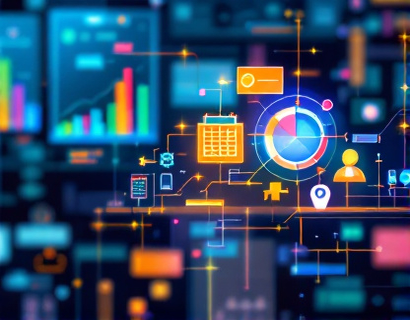AI-Powered Mental Health Navigator: Transforming Access to Psychiatric Services and Industry Knowledge
The integration of artificial intelligence in the mental health sector has paved the way for innovative solutions that enhance access to specialized insights and support. An AI-powered chatbot, designed with a focus on delivering accurate and safe information, is revolutionizing how individuals engage with psychiatric services and the broader mental health industry. This technology is particularly beneficial for a diverse audience that includes children, students, mental health enthusiasts, educators, and healthcare professionals. The chatbot ensures that users can interact with complex mental health topics in a manner that is both educational and responsible, fostering a confident and informed approach to mental health.
Ensuring Content Accuracy and Safety
One of the primary challenges in providing mental health information is ensuring its accuracy and safety, especially for vulnerable audiences such as children and students. The AI-powered chatbot addresses this by incorporating rigorous content verification processes. All information provided is cross-referenced with credible sources, including peer-reviewed journals, official health organization guidelines, and expert opinions. This multi-layered verification process guarantees that users receive reliable and up-to-date content, reducing the risk of misinformation.
For children and students, the chatbot is designed with additional safety measures. The language used is simplified and age-appropriate, ensuring that complex concepts are explained in a way that is easy to understand. The chatbot also includes features to detect and respond to sensitive queries with care, providing reassurance and guidance without overwhelming the user. This approach not only educates but also supports the emotional well-being of young users.
Specialized Insights for a Diverse Audience
The AI chatbot offers specialized insights tailored to different user groups, each with unique needs and levels of understanding. For mental health enthusiasts and general users, the chatbot provides comprehensive overviews of mental health topics, including common disorders, treatment options, and preventive measures. It covers a wide range of subjects, from anxiety and depression to more specialized areas like bipolar disorder and schizophrenia.
Healthcare professionals, including doctors, nurses, and social workers, benefit from in-depth information and the latest research findings. The chatbot can provide detailed explanations of psychiatric conditions, treatment protocols, and emerging therapies. It also offers insights into best practices for patient care and management, helping professionals stay updated with the latest industry standards and guidelines.
Educators play a crucial role in mental health awareness and support within schools and communities. The chatbot provides resources and information specifically designed for educational settings, including lesson plans, activity ideas, and discussion prompts. It helps educators create a supportive environment that promotes mental health literacy and reduces stigma among students.
Interactive and Engaging User Experience
The AI chatbot is designed to be interactive and user-friendly, making the process of seeking mental health information engaging and straightforward. Users can initiate conversations by asking specific questions, browsing through categories, or using keyword searches. The chatbot's natural language processing capabilities allow it to understand and respond to a wide range of queries, providing relevant and context-specific information.
For a more personalized experience, users can select their preferred level of detail and the type of content they are interested in. Whether it's a brief summary or an in-depth analysis, the chatbot adapts to the user's needs, ensuring that the information is both accessible and comprehensive. This flexibility makes the chatbot a valuable tool for anyone looking to deepen their understanding of mental health topics.
Supporting Children and Students
For children and students, the chatbot serves as a safe and supportive resource. It offers age-appropriate content that addresses common mental health concerns and provides guidance on how to seek help. The chatbot can answer questions about feelings, stress management, and coping strategies in a way that is reassuring and non-threatening. It also includes links to additional resources, such as helplines and support groups, ensuring that users have access to further assistance if needed.
To enhance the educational value, the chatbot can engage in interactive sessions, such as quizzes and games, to reinforce learning and make the experience more enjoyable. These interactive elements are designed to be both fun and informative, helping children and students build a solid foundation in mental health knowledge.
Empowering Healthcare Professionals
Healthcare professionals rely on the chatbot for quick access to specialized information and ongoing education. The chatbot can provide detailed case studies, treatment protocols, and research articles, helping professionals make informed decisions in their practice. It also offers insights into the latest clinical guidelines and regulatory updates, ensuring that users are aware of the current standards in psychiatric care.
For continuing education, the chatbot can recommend relevant courses, webinars, and conferences. It can also facilitate connections with other professionals, fostering a community of practice where knowledge and experiences can be shared. This collaborative approach enhances the overall quality of care and promotes best practices in the mental health field.
Building Trust and Confidence
Trust is paramount when it comes to mental health information. The AI chatbot builds trust by consistently providing accurate and reliable content. Users can have confidence in the information they receive, knowing that it has been thoroughly vetted and sourced from reputable entities. This trust is further reinforced by the chatbot's transparent approach, clearly indicating the origins of the information and providing citations where applicable.
For users who may be hesitant or uncertain about mental health topics, the chatbot offers reassurance and support. It provides empathetic responses and guidance, helping users feel more comfortable and empowered to seek help. By demystifying complex concepts and offering practical advice, the chatbot plays a crucial role in reducing stigma and encouraging open discussions about mental health.
Promoting Responsible Engagement
While the chatbot is a powerful tool for accessing mental health information, it is essential to promote responsible engagement. Users are encouraged to seek professional help when needed, and the chatbot clearly states that it is not a substitute for qualified medical advice. It provides information on how to find local mental health services and support groups, ensuring that users have the resources they need for comprehensive care.
The chatbot also includes guidelines on how to use mental health information responsibly. It emphasizes the importance of privacy and confidentiality, advising users to protect their personal information and seek help in a safe and secure manner. By fostering a responsible approach to mental health engagement, the chatbot contributes to a healthier and more informed community.
Conclusion
The AI-powered chatbot represents a significant advancement in making mental health information accessible and reliable for a diverse audience. By ensuring content accuracy, safety, and appropriateness, it empowers individuals to engage with mental health topics confidently and responsibly. Whether for personal learning, professional development, or educational purposes, the chatbot serves as a valuable resource that supports the well-being and mental health of users across all age groups.











































